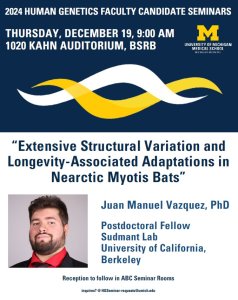Presented By: Department of Human Genetics
DHG Faculty Candidate Seminar | 12/19/24 | Kahn Auditorium 9am
Juan Manuel Vazquez, PhD - University of California, Berkeley

Juan Manuel Vazquez, PhD
NIA K99/R00 Postdoctoral Fellow
NSF Postdoctoral Research Fellow
University of California, Berkeley
Please join us at his seminar “Extensive Structural Variation and Longevity-Associated Adaptations in Nearctic Myotis Bats” on Thursday, December 19th, 2024, at 9:00 am in the Kahn Auditorium – BSRB. There will be a reception with light refreshments to follow in the ABC seminar rooms.
ABSRACT
The genus Myotis is one of the largest clades of bats, and exhibits some of the most extreme variation in lifespans among mammals. To study the evolution of longevity-associated traits, we generated primary cell lines for over 28 species of bats, and assembled near-complete diploid genome assemblies for 8 Myotis species. Using genome-wide screens of positive selection, analyses of structural variation, and functional experiments in primary cell lines, we identify new patterns of adaptation contributing to longevity, cancer resistance, and viral interactions in bats. We find that Myotis bats have some of the most significant variation in cancer risk across mammals and demonstrate a unique DNA damage response in primary cells of the long-lived M. lucifugus. We also find evidence of extensive structural variation both within and between species, including in genes central to stress response and viral immunity. Together, our results demonstrate how genomics and primary cells derived from diverse taxa uncover the molecular bases of extreme adaptations in non-model organisms.
NIA K99/R00 Postdoctoral Fellow
NSF Postdoctoral Research Fellow
University of California, Berkeley
Please join us at his seminar “Extensive Structural Variation and Longevity-Associated Adaptations in Nearctic Myotis Bats” on Thursday, December 19th, 2024, at 9:00 am in the Kahn Auditorium – BSRB. There will be a reception with light refreshments to follow in the ABC seminar rooms.
ABSRACT
The genus Myotis is one of the largest clades of bats, and exhibits some of the most extreme variation in lifespans among mammals. To study the evolution of longevity-associated traits, we generated primary cell lines for over 28 species of bats, and assembled near-complete diploid genome assemblies for 8 Myotis species. Using genome-wide screens of positive selection, analyses of structural variation, and functional experiments in primary cell lines, we identify new patterns of adaptation contributing to longevity, cancer resistance, and viral interactions in bats. We find that Myotis bats have some of the most significant variation in cancer risk across mammals and demonstrate a unique DNA damage response in primary cells of the long-lived M. lucifugus. We also find evidence of extensive structural variation both within and between species, including in genes central to stress response and viral immunity. Together, our results demonstrate how genomics and primary cells derived from diverse taxa uncover the molecular bases of extreme adaptations in non-model organisms.